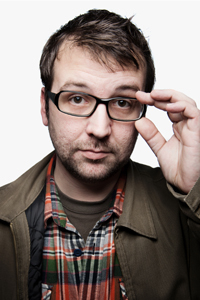

Web Exclusive: Working the Scene
arts & culture - March 2012
By Amelia Compton Wolff
Christoph Wahl

How did your interest in organs originate?
My mother was an organist and I would accompany her to choir rehearsals and would watch my father on service calls from a very early age. I feel lucky to have had their guidance and to have grown up in a house where music and objects were things to be made, not just consumed. That said, Appleton is also an odd incubator for the interest. Two of my closest friends, Paul Weber and Dan Schwandt, were classmates of mine at Appleton West High School and are now professional organists who earned advance degrees and now teach or perform on the national level. It helped the teenage me to not be alone in my obsessions.
How did you get your start building them?
Through my father, mostly. I grew up watching him make things and "assisted" as I could. We did small jobs out of his garage workshop from when I was ten or so. I then started work in New Hampshire and the Boston area with various organbuilders, working mainly with a firm that removed old organs from closed churches and found new homes for them. It was a great education; I disassembled and documented 80 or so organs, met many organbuilders, and got to travel the country. As a teenager, no less! I am grateful that my parents gave me that freedom.
After high school I attended Lawrence University and studied art for three years and just barely left under my own power. I was a horrible student and the experience, while excellent, was not for me. I set to work as a craftsman, building organs, and set up our current shop with my father in the spring of 1999. Since that time Wahl Organbuilders has built over 20 new mechanical-action instruments of our own design.
How do you approach building a new organ? Restoring an existing one?
Our design process usually begins with a call from the potential client. We advertise in trade journals and our website has brought in some business, but most clients approach us first. We get most of our work via referrals from past clients and other friends. We also occasionally build smaller instruments on speculation, but the economy has been less friendly to this practice in the last few years.
After meeting with the client and listening to their needs we design an instrument for them and their space. Design-wise I hope that we are creating instruments that are not only properly fitting to the needs of a given client but also reflective of our age. Organs have been built for two millenia and it is easy to revert to old paths. I hope that we respect tradition and create a knowable object, but I also hope we contribute something that reflects who we and our clients are today.
Once a plan is agreed to we sign a contract and put the work in our queue. Our projects tend to the small side, but the lead time is still usually 9-14 months from contract signing to installation.
Who has influenced your career most?
I've been very lucky to have had many mentors in my life, but I would likely have to place the highest credit to my late boss, mentor, and friend Alan Miller Laufman. Alan was a clarifying force for me during my teenage years. He opened many doors for me professionally, instilled a love of the 19th century American organ that continues to inspire my current work, read me the complete Odyssey out loud, and left me with an abiding love of cats and the music of Johannes Brahms. What else, really, is there? Alan was a great force and left me with a deep personal and professional momentum that sustains me to this day.
Are there advantages of doing business in Appleton? Challenges?
Appleton is a great place to have our shop. As I said before there is an odd culture that seems to produce organ geeks galore, but as a businessman I have special praise for the educational institutions that keep the labor market vigorous and well-prepared for work. We have never advertised for workers; our employees have sought us out. And the inherent ingenuity and good work ethic of the Fox Valley is to be thanked for this.
THAT SAID- you're never a prophet in your own land. I would enjoy the chance to do more work in my home town some day. Contracts far afield are necessary and good, but I look forward to a chance to stay home for a while. I look forward to a chance to supply our voice to the valley.
Any projects hold a special place in your heart?
The next one.